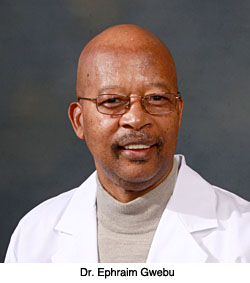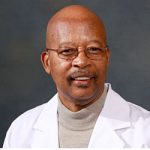Gwebu: students must be highly motivated to succeed in Chemistry Geology and Physics
Kesha Williams
March 26 2012
 Article: Visit the webpage of the ECSU Department of Chemistry Geology and Physics and you will find details explaining how the faculty is preparing its graduates for careers in 10 categories.
Article: Visit the webpage of the ECSU Department of Chemistry Geology and Physics and you will find details explaining how the faculty is preparing its graduates for careers in 10 categories.
Dr. Ephraim Gwebu chairperson of the Department of Chemistry Geology and Physics at Elizabeth City State University says students who choose those majors face a tough challenge but they can excel. They must be highly motivated diligent and flexible to meet the challenges of the future.
The government is recommending that college curriculums prepare students who understand that the sciences are more intertwined than ever before. Students who graduate with a degree in biology chemistry or physics should be prepared to talk about the role mathematics plays in those sciences Gwebu said.
Research experience familiarity with equipment and methodologies used in scientific laboratories will allow the best young scientists to advance during the course of their career. Work options vary widely for chemists who elect to work in assorted research sectors. Chemists are actively involved in the development of products consumers use every day from cosmetics to drugs fabrics plastics and rubber products.
Geology students also have a wide range of work options as scientists in that field search for answers to questions regarding the Earth’s changes. According to the U.S. Labor Department’s 2010-2011 Occupational Handbook the demand for geologists is expected to grow by three percent ‘over the 2008-2018 decade. Competition the Labor Department reports for chemists is expected to be keen those holding advance degrees are likely to find jobs with pharmaceutical and biotechnology firms. Gwebu advises students to prepare now as undergraduates for the challenges ahead.
In order to become a good scientist in the future a student must be self-motivated to obtain academic excellence. The student must spend a great deal of time on academics Gwebu said. High school students should have the necessary background to enter college science courses. However students who are motivated to learn can overcome high school deficiencies.
Gwebu shakes off students’ complaints that they did not take calculus and other advanced courses in high school. From his own struggles as a child growing up in Zimbabwe he learned that obstacles can and should be overcome.
Nobody in my village spoke English. It wasn’t until third grade that I began learning it. But I did not allow that to be an excuse for learning the language he said. Today it is easy for students to learn about basic principles of math chemistry biology. Just go on the Internet and it is all there Gwebu said. If you don’t own a computer you can go to the public library and use one. Many of the students have phones that allow you to access the Internet. You can learn if you really want to.
He earned dual degrees in chemistry and education a doctorate in physiological chemistry (University of Sierra Leone) a doctorate degree in physiological chemistry (The Ohio State University. Over the last 20 years Gwebu has conducted numerous related research projects and published articles in scientific journals He welcomed undergraduate students to contribute to those articles and earn credit as a co-author. He taught chemistry and biochemistry at Oakwood University (Huntsville Alabama) for 21 years before coming to ECSU in 2003.
At ECSU Gwebu is an instructor who is still actively involved in research. He oversees a program funded by the National Institutes of Health (NIH) that provides students with a 10-week research project under the mentorship of prominent of U.S. and African scientists at universities in Swaziland Botswana and South Africa. The grant also covers the cost of travel expenses and pays the students $2500 stipend for their work. The students participating had a variety of majors-physics psychology sociology and social work. The program initially was funded in 2005 by the NIH for $875448. Since then the grant has been renewed and grown to $2.1 million. The 70 students who have participated since the program’s inception have entered graduate programs to earn advanced degrees or gone on to medical school dental school and pharmacy programs.
Gwebu secured a second NIH grant in 2009 that funds research projects students complete while earning their bachelor’s degrees. The students earn $13 an hour for working 15 hours per week on their research projects. During the summer they spend 10 weeks at research intensive universities acquiring additional research experiences. All participants are required to pursue graduate studies after earning their undergraduate degree. These are extraordinary opportunities for ECSU students that Gwebu is confident will prepare them for a prosperous future.
As department chairperson Gwebu supervises 11 full-time faculty and three adjunct faculty. He proudly reports that 65 percent of the department’s faculty members have obtained external funding for programs and projects that designed to enrich the academic instruction offered. Grants have been funded by the NIH the U.S. Department of Defense the National Science Foundation and organizations in North Carolina that fund scientific research. Most of the grants Gwebu said will allow professors and students to conduct their research for at least three years.
Gwebu and the faculty and staff in the Department of Chemistry Geology and Physics have labored attentively to lead students through the department’s rigorous curriculums. They urge students to take preparatory courses for the oft- dreaded standardized tests — GRE PCAT MCAT — that serve as gatekeepers to many of the nation’s best graduate and professional schools. Students who have earned their bachelor’s degrees from the department have gone on to careers with chemical and pharmaceutical companies research laboratories and government agencies. Others have entered medical school dental school and pharmacy programs. Gwebu said the faculty continues trying different methods to increase student success.
The faculty here is qualified to teach in their discipline. They are publishing papers with their students as co-authors. They attend scholarly meetings in their disciplines and they maintain membership in relevant scholarly organizations Gwebu said. They are motivated and dedicated to give instruction. They are even willing to form partnerships with professors from other academic disciplines if it is necessary to help students improve in areas where they might have weaknesses.


